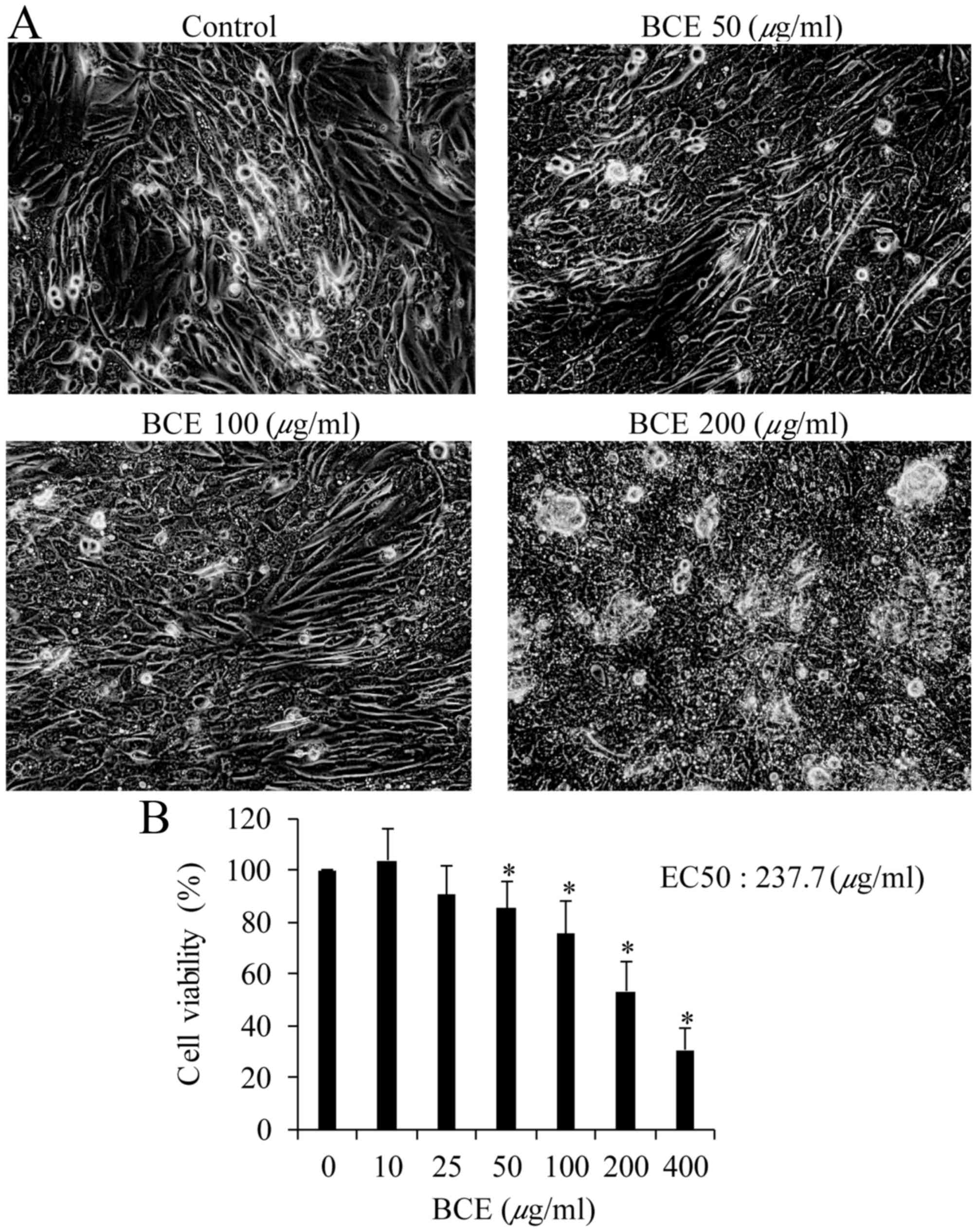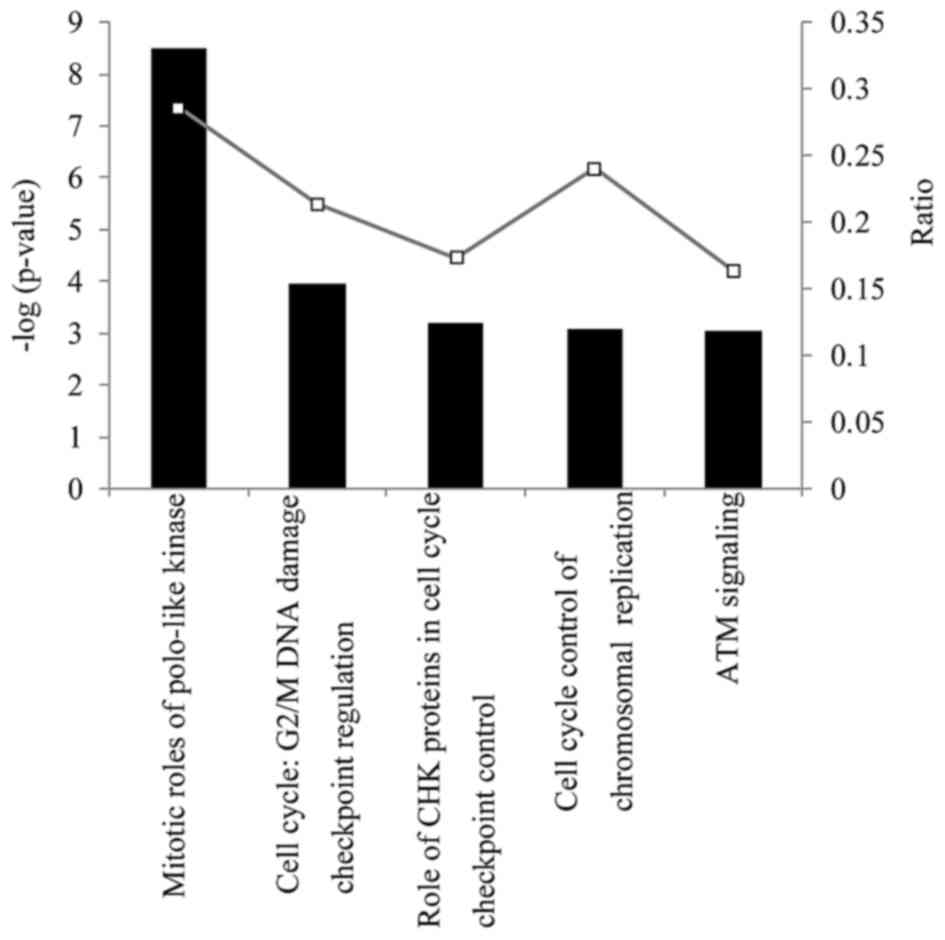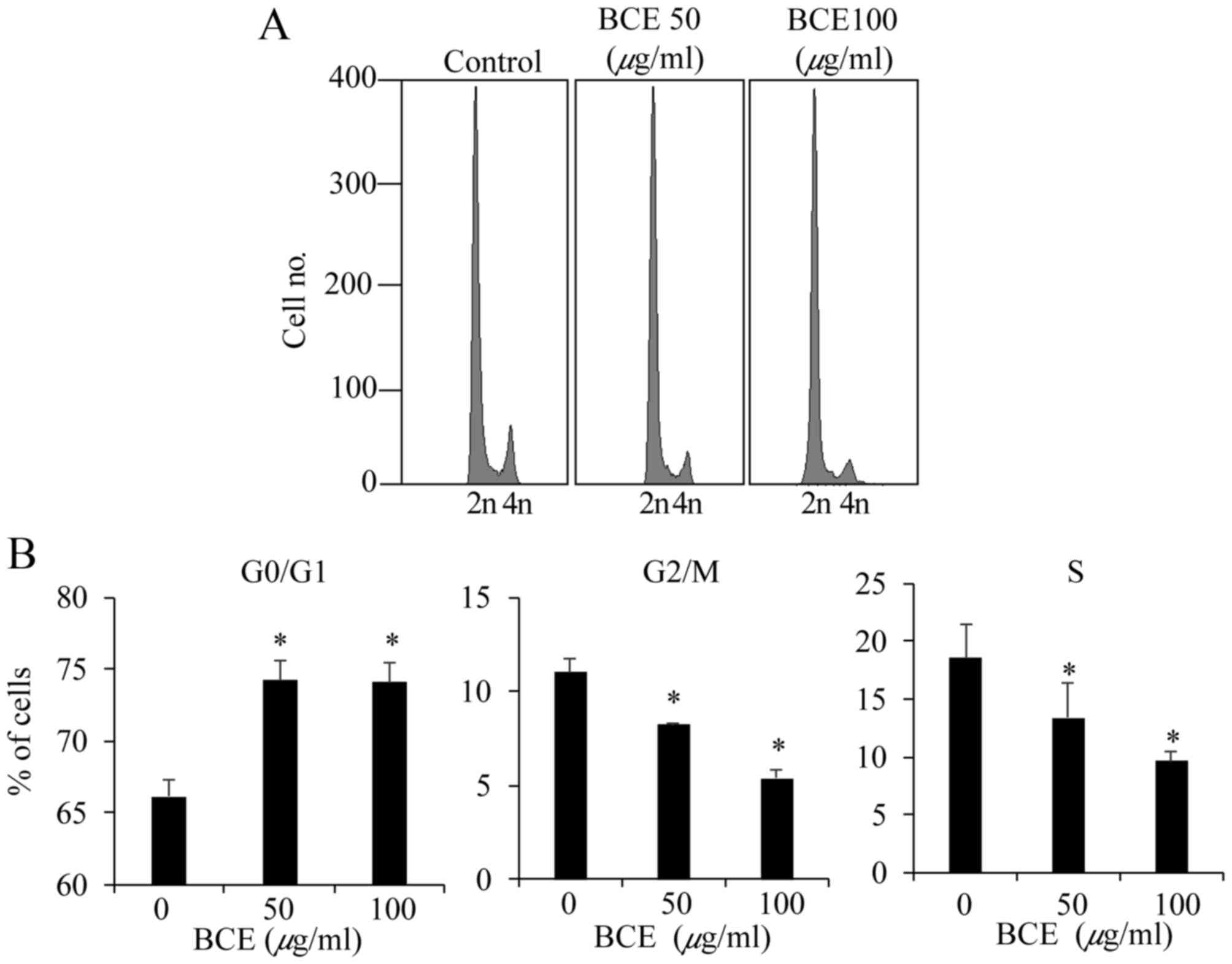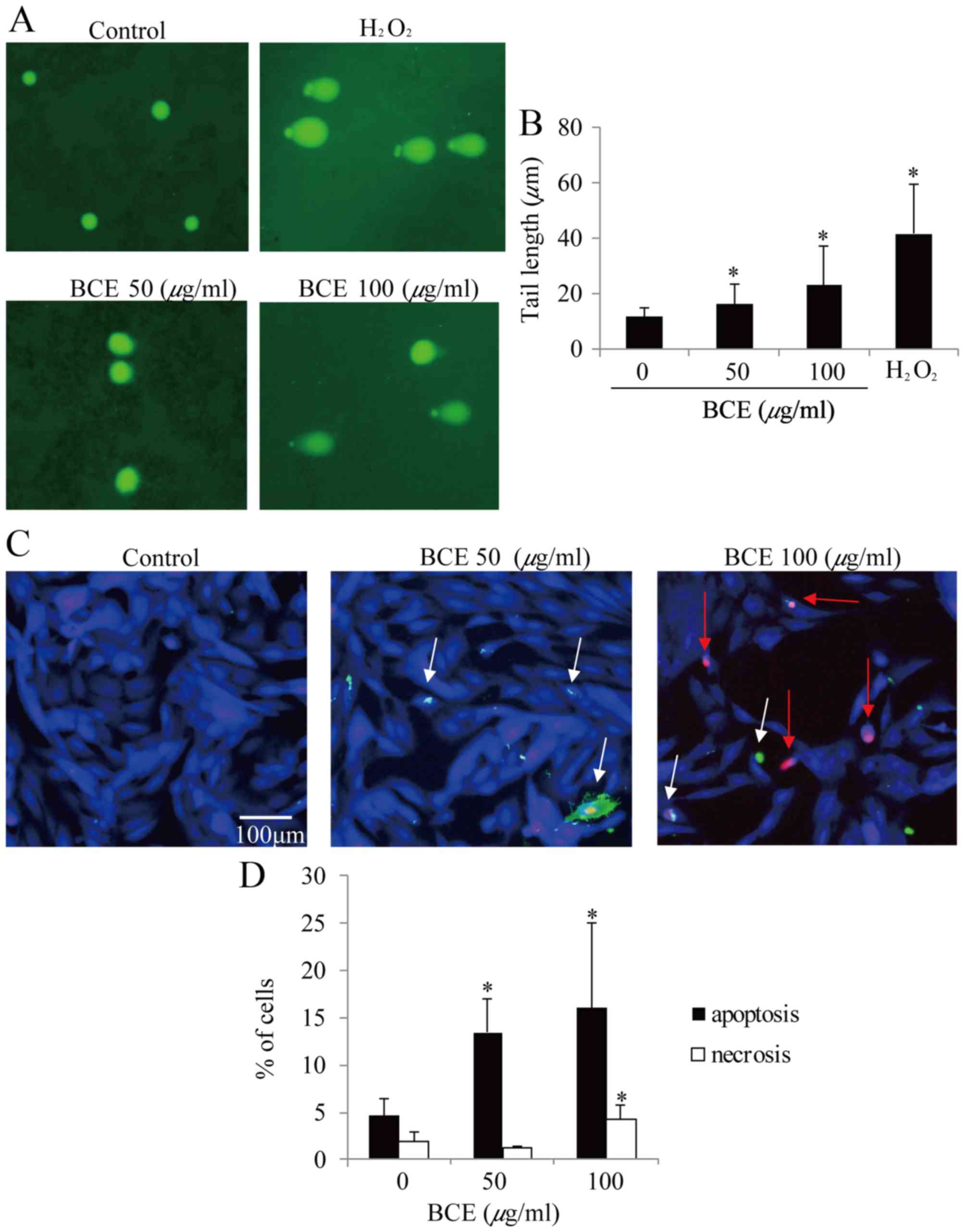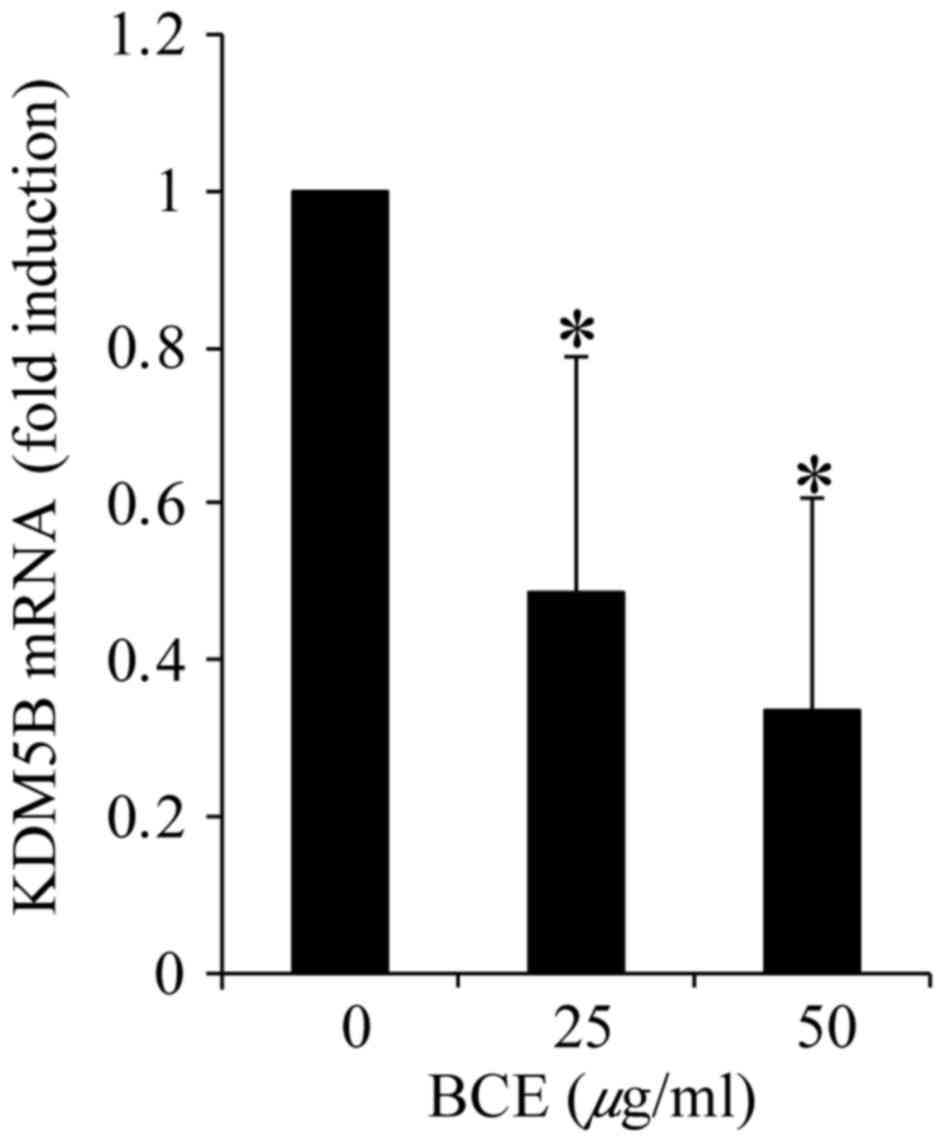|
1
|
Delazar A, Khodaie L, Afshar J, Nahar L
and Sarker SD: Isolation and free-radical-scavenging properties of
cyanidin 3-O-glycosides from the fruits of Ribes biebersteinii.
Berl. Acta Pharm. 60:1–11. 2010. View Article : Google Scholar : PubMed/NCBI
|
|
2
|
Gopalan A, Reuben SC, Ahmed S, Darvesh AS,
Hohmann J and Bishayee A: The health benefits of blackcurrants.
Food Funct. 3:795–809. 2012. View Article : Google Scholar : PubMed/NCBI
|
|
3
|
Määttä KR, Kamal-Eldin A and Törrönen AR:
High-performance liquid chromatography (HPLC) analysis of phenolic
compounds in berries with diode array and electrospray ionization
mass spectrometric (MS) detection: Ribes species. J Agric Food
Chem. 51:6736–6744. 2003. View Article : Google Scholar : PubMed/NCBI
|
|
4
|
Nielsen IL, Haren GR, Magnussen EL,
Dragsted LO and Rasmussen SE: Quantification of anthocyanins in
commercial black currant juices by simple high-performance liquid
chromatography. Investigation of their pH stability and
antioxidative potency. J Agric Food Chem. 51:5861–5866. 2003.
View Article : Google Scholar : PubMed/NCBI
|
|
5
|
Matsumoto H, Takenami E, Iwasaki-Kurashige
K, Osada T, Katsumura T and Hamaoka T: Effects of blackcurrant
anthocyanin intake on peripheral muscle circulation during typing
work in humans. Eur J Appl Physiol. 94:36–45. 2005. View Article : Google Scholar : PubMed/NCBI
|
|
6
|
Zhu Y, Xia M, Yang Y, Liu F, Li Z, Hao Y,
Mi M, Jin T and Ling W: Purified anthocyanin supplementation
improves endothelial function via NO-cGMP activation in
hypercholesterolemic individuals. Clin Chem. 57:1524–1533. 2011.
View Article : Google Scholar : PubMed/NCBI
|
|
7
|
Yamamoto A, Nakashima K, Kawamorita S,
Sugiyama A, Miura M, Kamitai Y and Kato Y: Protective effects of
raw and cooked blackcurrant extract on DNA damage induced by
hydrogen peroxide in human lymphoblastoid cells. Pharm Biol.
52:782–788. 2014. View Article : Google Scholar : PubMed/NCBI
|
|
8
|
Aiyer HS, Warri AM, Woode DR,
Hilakivi-Clarke L and Clarke R: Influence of berry polyphenols on
receptor signaling and cell-death pathways: Implications for breast
cancer prevention. J Agric Food Chem. 60:5693–5708. 2012.
View Article : Google Scholar : PubMed/NCBI
|
|
9
|
Boivin D, Blanchette M, Barrette S,
Moghrabi A and Beliveau R: Inhibition of cancer cell proliferation
and suppression of TNF-induced activation of NFkappaB by edible
berry juice. Anticancer Res. 27:937–948. 2007.PubMed/NCBI
|
|
10
|
Olsson ME, Gustavsson KE, Andersson S,
Nilsson A and Duan RD: Inhibition of cancer cell proliferation in
vitro by fruit and berry extracts and correlations with antioxidant
levels. J Agric Food Chem. 52:7264–7271. 2004. View Article : Google Scholar : PubMed/NCBI
|
|
11
|
Catchpole S, Spencer-Dene B, Hall D,
Santangelo S, Rosewell I, Guenatri M, Beatson R, Scibetta AG,
Burchell JM and Taylor-Papadimitriou J: PLU-1/JARID1B/KDM5B is
required for embryonic survival and contributes to cell
proliferation in the mammary gland and in ER+ breast cancer cells.
Int J Oncol. 38:1267–1277. 2011.PubMed/NCBI
|
|
12
|
Li X, Liu L, Yang S, Song N, Zhou X, Gao
J, Yu N, Shan L, Wang Q, Liang J, et al: Histone demethylase KDM5B
is a key regulator of genome stability. Proc Natl Acad Sci USA.
111:7096–7101. 2014; View Article : Google Scholar : PubMed/NCBI
|
|
13
|
Nanashima N, Horie K, Tomisawa T, Chiba M,
Nakano M, Fujita T, Maeda H, Kitajima M, Takamagi S, Uchiyama D, et
al: Phytoestrogenic activity of blackcurrant (Ribes nigrum)
anthocyanins is mediated through estrogen receptor alpha. Mol Nutr
Food Res. 59:2419–2431. 2015. View Article : Google Scholar : PubMed/NCBI
|
|
14
|
Nanashima N, Yamada T, Shimizu T and
Tsuchida S: Deletion of phospholipase A2 group IVc induces
apoptosis in rat mammary tumour cells by the nuclear
factor-κB/lipocalin 2 pathway. Biochem J. 469:315–324. 2015.
View Article : Google Scholar : PubMed/NCBI
|
|
15
|
Livak KJ and Schmittgen TD: Analysis of
relative gene expression data using real-time quantitative PCR and
the 2(-Delta Delta C(T)) method. Methods. 25:402–408. 2001.
View Article : Google Scholar : PubMed/NCBI
|
|
16
|
Lin CJ, Chang YA, Lin YL, Liu SH, Chang CK
and Chen RM: Preclinical effects of honokiol on treating
glioblastoma multiforme via G1 phase arrest and cell apoptosis.
Phytomedicine. 23:517–527. 2016. View Article : Google Scholar : PubMed/NCBI
|
|
17
|
Lu JJ, Cai YJ and Ding J: Curcumin induces
DNA damage and caffeine-insensitive cell cycle arrest in colorectal
carcinoma HCT116 cells. Mol Cell Biochem. 354:247–252. 2011.
View Article : Google Scholar : PubMed/NCBI
|
|
18
|
Ouyang G, Yao L, Ruan K, Song G, Mao Y and
Bao S: Genistein induces G2/M cell cycle arrest and apoptosis of
human ovarian cancer cells via activation of DNA damage checkpoint
pathways. Cell Biol Int. 33:1237–1244. 2009. View Article : Google Scholar : PubMed/NCBI
|
|
19
|
Zhang Z, Wang CZ, Du GJ, Qi LW, Calway T,
He TC, Du W and Yuan CS: Genistein induces G2/M cell cycle arrest
and apoptosis via ATM/p53-dependent pathway in human colon cancer
cells. Int J Oncol. 43:289–296. 2013. View Article : Google Scholar : PubMed/NCBI
|
|
20
|
Wu QK, Koponen JM, Mykkanen HM and
Törrönen AR: Berry phenolic extracts modulate the expression of p21
(WAF1) and Bax but not Bcl-2 in HT-29 colon cancer cells. J Agric
Food Chem. 55:1156–1163. 2007. View Article : Google Scholar : PubMed/NCBI
|
|
21
|
Bishayee A, Haznagy-Radnai E, Mbimba T,
Sipos P, Morazzoni P, Darvesh AS, Bhatia D and Hohmann J:
Anthocyanin-rich black currant extract suppresses the growth of
human hepatocellular carcinoma cells. Nat Prod Commun. 5:1613–1618.
2010.PubMed/NCBI
|
|
22
|
Strebhardt K: Multifaceted polo-like
kinases: Drug targets and antitargets for cancer therapy. Nat Rev
Drug Discov. 9:643–660. 2010. View
Article : Google Scholar : PubMed/NCBI
|
|
23
|
Ng WT Weng, Shin JS, Roberts TL, Wang B
and Lee CS: Molecular interactions of polo-like kinase 1 in human
cancers. J Clin Pathol. 69:557–562. 2016. View Article : Google Scholar : PubMed/NCBI
|
|
24
|
Asteriti IA, De Mattia F and Guarguaglini
G: Cross-talk between AURKA and Plk1 in mitotic entry and spindle
assembly. Front Oncol. 5:2832015. View Article : Google Scholar : PubMed/NCBI
|
|
25
|
Guo D, Wang J, Wang X, Luo H, Zhang H, Cao
D, Chen L and Huang N: Double directional adjusting estrogenic
effect of naringin from Rhizoma drynariae (Gusuibu). J
Ethnopharmacol. 138:451–457. 2011. View Article : Google Scholar : PubMed/NCBI
|
|
26
|
Lee YM, Kim JB, Bae JH, Lee JS, Kim PS,
Jang HH and Kim HR: Estrogen-like activity of aqueous extract from
Agrimonia pilosa Ledeb. in MCF-7 cells. BMC Complement Altern Med.
12:2602012. View Article : Google Scholar : PubMed/NCBI
|
|
27
|
Limer JL and Speirs V: Phyto-oestrogens
and breast cancer chemoprevention. Breast Cancer Res. 6:119–127.
2004. View
Article : Google Scholar : PubMed/NCBI
|
|
28
|
Mahmoud AM, Yang W and Bosland MC: Soy
isoflavones and prostate cancer: A review of molecular mechanisms.
J Steroid Biochem Mol Biol. 140:116–132. 2014. View Article : Google Scholar : PubMed/NCBI
|
|
29
|
Li T, Zhu J, Guo L, Shi X, Liu Y and Yang
X: Differential effects of polyphenols-enriched extracts from
hawthorn fruit peels and fleshes on cell cycle and apoptosis in
human MCF-7 breast carcinoma cells. Food Chem. 141:1008–1018. 2013.
View Article : Google Scholar : PubMed/NCBI
|
|
30
|
Rice S and Whitehead SA: Phytoestrogens
oestrogen synthesis and breast cancer. J Steroid Biochem Mol Biol.
108:186–195. 2008. View Article : Google Scholar : PubMed/NCBI
|
|
31
|
Seo HS, Ju JH, Jang K and Shin I:
Induction of apoptotic cell death by phytoestrogens by
up-regulating the levels of phospho-p53 and p21 in normal and
malignant estrogen receptor α-negative breast cells. Nutr Res.
31:139–146. 2011. View Article : Google Scholar : PubMed/NCBI
|
|
32
|
Prasad R and Katiyar SK: Polyphenols from
green tea inhibit the growth of melanoma cells through inhibition
of class I histone deacetylases and induction of DNA damage. Genes
Cancer. 6:49–61. 2015.PubMed/NCBI
|
|
33
|
Demoulin B, Hermant M, Castrogiovanni C,
Staudt C and Dumont P: Resveratrol induces DNA damage in colon
cancer cells by poisoning topoisomerase II and activates the ATM
kinase to trigger p53-dependent apoptosis. Toxicol In Vitro.
29:1156–1165. 2015. View Article : Google Scholar : PubMed/NCBI
|
|
34
|
Yamane K, Tateishi K, Klose RJ, Fang J,
Fabrizio LA, Erdjument-Bromage H, Taylor-Papadimitriou J, Tempst P
and Zhang Y: PLU-1 is an H3K4 demethylase involved in
transcriptional repression and breast cancer cell proliferation.
Mol Cell. 25:801–812. 2007. View Article : Google Scholar : PubMed/NCBI
|
|
35
|
Zou MR, Cao J, Liu Z, Huh SJ, Polyak K and
Yan Q: Histone demethylase jumonji AT-rich interactive domain 1B
(JARID1B) controls mammary gland development by regulating key
developmental and lineage specification genes. J Biol Chem.
289:17620–17633. 2014. View Article : Google Scholar : PubMed/NCBI
|
|
36
|
Barrett KL, Demiranda D and Katula KS:
Cyclin b1 promoter activity and functional cdk1 complex formation
in G1 phase of human breast cancer cells. Cell Biol Int. 26:19–28.
2002. View Article : Google Scholar : PubMed/NCBI
|
|
37
|
Chang DC, Xu N and Luo KQ: Degradation of
cyclin B is required for the onset of anaphase in Mammalian cells.
J Biol Chem. 278:37865–37873. 2003. View Article : Google Scholar : PubMed/NCBI
|
|
38
|
Ducommun B, Brambilla P, Félix MA, Franza
BR Jr, Karsenti E and Draetta G: cdc2 phosphorylation is required
for its interaction with cyclin. EMBO J. 10:3311–3319.
1991.PubMed/NCBI
|
|
39
|
Scibetta AG, Santangelo S, Coleman J, Hall
D, Chaplin T, Copier J, Catchpole S, Burchell J and
Taylor-Papadimitriou J: Functional analysis of the transcription
repressor PLU-1/JARID1B. Mol Cell Biol. 27:7220–7235. 2007.
View Article : Google Scholar : PubMed/NCBI
|
|
40
|
Mitra D, Das PM, Huynh FC and Jones FE:
Jumonji/ARID1 B (JARID1B) protein promotes breast tumor cell cycle
progression through epigenetic repression of microRNA let-7e. J
Biol Chem. 286:40531–40535. 2011. View Article : Google Scholar : PubMed/NCBI
|















